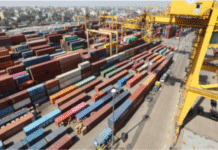18 units are already in operation in Panchagarh, Thakurgaon

Tea processing factories are being set up in Panchagarh in increasing numbers in keeping with the fast-expanding cultivation of the popular beverage in northern districts.
Seventeen tea processing factories are already in operation in Panchagarh and one in Thakurgaon, according to the Bangladesh Tea Board (BTB).
Five more factories are under construction in Panchagarh and will commence commercial operations soon. The state-run agency has given approval to a total of 32 firms to set up processing units.
“If the factories run efficiently, both owners and growers will benefit from the growing cultivation, and the promising tea industry in the northern part will play an important role in the economy,” said Mohammad Shamim Al Mamun, senior scientific officer of the regional office of the BTB in Panchagarh.
Tea cultivation in the flatlands of Panchagarh began in the late 1990s thanks to its favourable weather and soil. It soon expanded to other districts in the region.
In the last two decades, Panchagarh and Thakurgaon have emerged as the third-largest tea producing regions in the country after Chattogram and Sylhet.
About 50,000 acres of land is suitable for tea cultivation in five northern districts — Panchagarh, Thakurgaon, Lalmonirhat, Dinajpur and Nilphamari — of which, 10,170 acres have been brought under cultivation by this season.
Tea plantation has expanded to 8,642 acres of land in Panchagarh, 1,293 acres in Thakurgaon, 112.96 acres in Lalmonirhat, 71.09 acres in Nilphamari, and 61.50 acres in Dinajpur.
Cultivation grew by 15 per cent per annum on average in the last five years in the northern part of Bangladesh. The sector has created jobs for around 25,000 people.
“As the land in the northern districts is more fertile than in Chattogram and Sylhet, growers can pluck leaves after a year of planting saplings,” said Mamun.
The plucking of green tea leaves and their processing began at the beginning of March and will continue until December.
Apart from 26 large gardens, there are 7,310 small farmers who produce tea on their own.
Large gardens and small growers in the five districts have a target to produce 12 million kilogrammes (kg) of tea, worth Tk 180 crore, in the current season by processing 60 million kg of raw tea leaves.
In 2020, tea was cultivated on 8,060 acres of land in the districts, and the target was to produce 9.5 million kg of tea.
Despite the coronavirus pandemic, the target was exceeded as 18 factories produced 10.3 million kg of tea by processing 50.12 million kg of raw leaves last year. The northern region accounted for about 12 per cent of national tea production in 2020.
In the initial stage of the plucking season, the collection of tea leaves has been lower. Authorities hope that the plucking will gain momentum by the middle of March, when all of the factories will resume operations at full speed.
Most of the factories have already started collecting raw tea leaves, said Monzur Alam, manager of Tentulia Green Care Tea Factory.
The factory, which started operations on March 2, needs 10,000 kg to 50,000 kg of raw leaves each day during the production period.
“I hope the tea leaves plucking will accelerate from the middle of March.”
Amirul Haque Khokon, president of the Panchagarh District Small Tea Garden Owners Association, said tea cultivation and production were increasing every year in the northern districts, especially in Panchagarh and Thakurgaon.
“The quality of tea in the areas is improving day by day,” he said.
Shah Alam, a director of Karatoya Tea Factory in Panchagarh, said the tea sector in the northern region is very promising. “The cultivation of tea can bring four times higher benefits in comparison to other crops.”
A grower can take home a profit of Tk 2 lakh to Tk 3 lakh from one acre of land, three to four years after planting the tea saplings, he added.
Golam Morshed of Dudumari village in Panchagarh sadar upazila cultivated tea on two acres of land three years ago. In the last season, he made a profit of Tk 2 lakh per acre. Now, he is bringing all of his lands under the coverage of tea cultivation.
Abu Hossain Md Shamsul Huda, a farmer of Hafijabad Khalpara village in the same upazila, previously cultivated different crops, including sugarcane, on his lands. He switched to tea cultivation about seven years ago and now grows the crop on eight acres of land.
“Tea cultivation is more profitable than other traditional crops.”
He pocketed a profit of Tk 2.5 lakh from each acre last season. “Now I am planting tea saplings on more lands.”
The government is encouraging farmers to expand tea cultivation by providing improved varieties of saplings and modern technologies at a lower cost, Mamun said.
A mobile app — Two Leaves One Bud — has been launched, and a pest management laboratory has been set up at the Panchagarh regional office to solve problems faced by farmers.
Various scientific aids are being provided to tea growers. They are given training on how to get rid of diseases and pest attacks, the BTB official said.
Tea growers and factory owners have been demanding the establishment of a tea auction market in Panchagarh for several years.
If an auction market is set up, it will help factory owners save Tk 3-4 per kg, which is being spent for transporting tea to the auction markets in Chattogarm and Sylhet from the northern districts.
Monzur Alam said if the auction market was set up in Panchagarh, both growers and factory owners would benefit.
“Factory owners will be able to save transport cost, monitor the market trend closely, and get fair prices. Ultimately, a portion of the additional profit will go to the growers.”
“Tea farmers will benefit after setting up an auction market in Panchagarh as it will help flourish the tea industry in the northern part and create more jobs,” said Amirul Haque Khokon, president of the Small Tea Garden Owners’ Association.
Mosharaf Hossain, general secretary of the Tea Factory Owners’ Association, said the existing factories had the capacity to process all of the raw leaves being currently produced. Any additional factories could pose a threat to the survival of the existing factories.
Khokon differed, saying a competitive market could help the promising tea sector in the northern region thrive.









